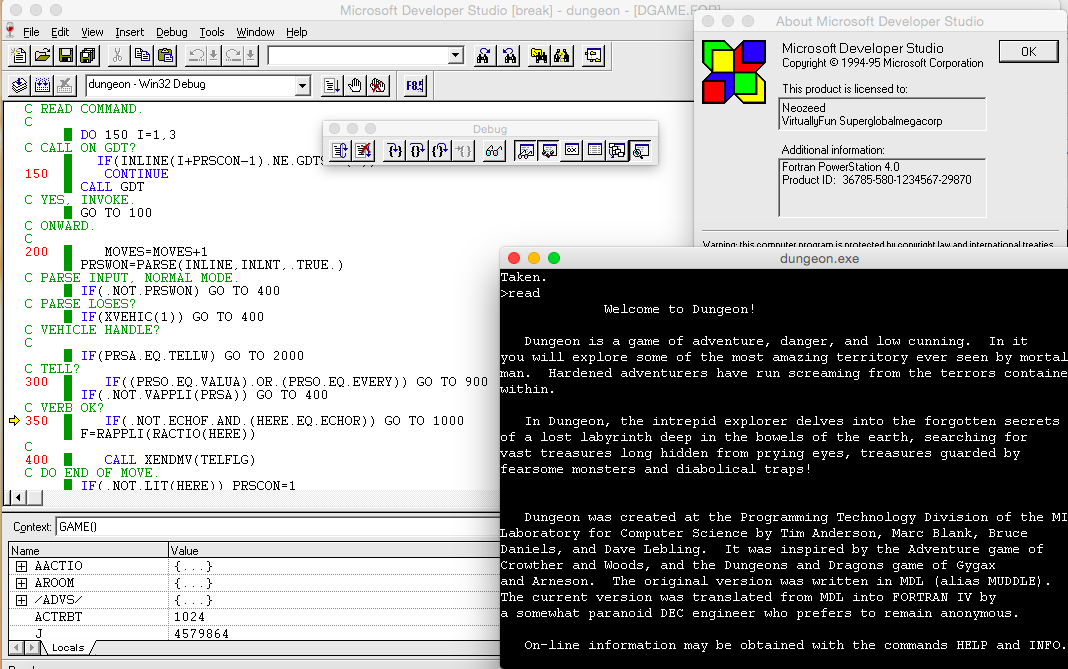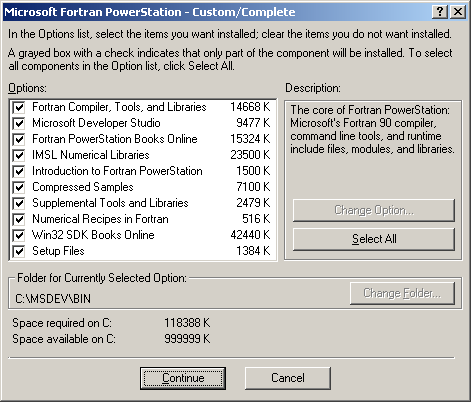- Microsoft Developer Studio Fortran Powerstation Download Full
- Microsoft Developer Studio Fortran Powerstation Download Free
- Microsoft Developer Studio Fortran Powerstation Download Windows 10
- Microsoft Developer Studio Fortran Powerstation Download 64-bit
Microsoft Fortran (FPSCDROM.EXE). It allows you to build and run Fortran programs of virtually any size with up to 4 GB of addressable RAM. Take advantage also of symmetric multiprocessing (on Windows NT), multi-threading, and preemptive multitasking. Visual Studio dev tools & services make app development easy for any platform & language. Try our Mac & Windows code editor, IDE, or Azure DevOps for free. FORTRAN PowerStation. Microsoft FORTRAN Powerstation was a rebranding of Microsoft's earlier Microsoft Fortran product. It featured support for 32-bit DOS and Microsoft Windows.
Microsoft Fortran PowerStation 4.0
Microsoft Corp stopped developing, supporting and selling their FORTRAN Powerstation compiler some time ago. It was still possible with TRNSYS 14.2 to use the Powerstation compiler to recreate the 32-bit trnlib.dll file needed to run TRNSYS. Unfortunately, the Powerstation compiler does not accept many of the TRNSYS features standard in version 15. It is highly recommended that you switch to Compaq Visual Fortran.
By excluding some of the standard TRNSYS 15 features, it is still possible to use the Powerstation 4.0 compiler. Below is a list of features that you will lose in doing so.
- Type56 (multizone building)
- Type61 (communication with non-fortran DLLs)
- Type66 (communication with Engineering Equation Solver routines)
- Communication with external programs
Setting up the Powerstation Project
Follow these instructions to get started using the MSFPS40 Developer Studio for handling the compiling, linking, and debugging of Fortran subroutines for TRNSYS.
1. Contact your TRNSYS distributor or go to the TRNSYS tutorials section of this website to download a modified version of the file exec.for.

2. Move the standard file trnsys15kernalexec.for to a safe location. Move the exec.for file that you downloaded with this document into trnsys15kernal
3. Start the MSFPS40 Developer Studio. Under the File menu, create a new Project Workspace. From the list of 'Types of Projects' select Dynamic Link Library. Give the project a name. For example, you might name the project 32trnsys and place it in the c:32trnsys directory.
4. Under the Insert menu, click Add Files to Project. Add all of the Fortran files (.for) from the Kernal and Types subdirectories in the /trnsys15 directory. Add the file dumf40.lib from the dummy subdirectory. Add your own custom components, if necessary.
5. You now need to remove a few files from the project. These are userlib.for, callprogram.f90, Type61.for and Type66.for.
Microsoft Developer Studio Fortran Powerstation Download Full

6. You also need to remove the call to userlib from trnsys.for. Open the file trnsys.for and search for 'CALL USERLIB'. There should be 2 instances.
7. Under the Build menu, click Settings. You will notice that there are numerous settings here controlled by a series of tabs. Below are the important settings for each of these tabs. Each tab can have several submenus, so there are many settings involved. Only the settings that must be changed from default values are described below. First, there should be two items in the left box called (in this example): 32TRN - Win32 Debug and 32TRN - Win32 Release. Be sure you have the Debug version selected.
Microsoft Developer Studio Fortran Powerstation Download Free
| Debug Tab | |
| General | Executable for session: c:trnsys15trnsys.exe |
| Working Directory: c:trnsys15 | |
| Program Arguments: c:32trnsyserror.txt | |
| Additional DLLs | |
| Fortran Tab | |
| Fortran Language | Local Name: c:trnsys15trnlib.dll (note: if you select both items in the left 'Settings for:' box, you cannot alter this category. You must select only the Debug project. |
| Click box by Extended Bounds and Error Checking | |
| Link Tab | |
| General | Output File: c:trnsys15trnlib.dll |
| Object/library modules: blank | |
| Check box 'Generate debug info.' | |
| Customize | Output filename should now read c:trnsys15trnlib.dll |
8. NOTE! In this step, the current trnlib.dll file will be overwritten! It is wise to back it up somewhere on your computer before proceeding! Under the Build menu, click Rebuild All. Watch the bottom window for errors and problems with compiling and creating the trnlib.dll output file. If everything worked correctly, the TRNSYS DLL was created in the trnsys15 directory and TRNSYS can be run with the updated DLL. To run TRNSYS, select Execute from the Build menu. TRNSYS will prompt you for a TRNSYS input file.
9. To use the debugging features of MSFPS40, select Debug from the Build menu, then Go. At this point, the program will state, 'TRNSYS.EXE does not have any debug information. OK?' Click OK because we are concerned with the Fortran DLL and not the TRNSYS executable. Without a breakpoint or a bug, TRNSYS will just start and run until the simulation is finished.
10. To halt execution at some point in the source code, insert breakpoints at one or more lines in the Fortran code of one or more subroutines. For example, open the file trnsys.for and create a breakpoint at the beginning of the source code, perhaps in the definitions of variables and common blocks. To create a breakpoint, put the cursor on a line of the source code and click F9. A red dot will appear to the left of the source code line. When TRNSYS is executing through the Debug feature of MSFPS40, it will always stop at this point in the code.

Microsoft Developer Studio Fortran Powerstation Download Windows 10
11. Experiment with the other debug commands by setting (and turning off) breakpoints with the F9 key, adding watch variables, stepping through the source code (F8), and running until you reach the cursor (F7). You can see the value of a variable simply by placing your cursor on top of that variable in the source code for a couple of seconds.
12. If your source code has a serious bug, such as trying to access an array outside of its boundaries, the debugger will simply stop and say that TRNSYS has exited with Code 1 (or something like that). At this point, access the file c:32trnsyserror.txt. In our setup (the Debug tab), we have redirected the error output to this file since TRNSYS.EXE will not allow the debugger to write the error message (the line number of the error, for example) to the screen.